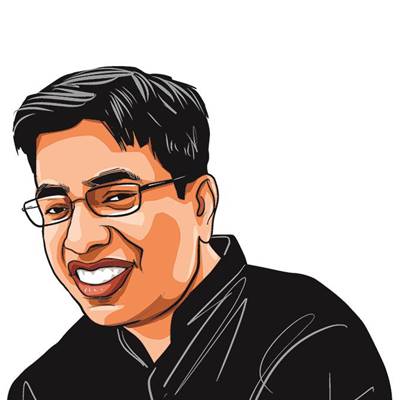Opinion Reducing Parliament to an echo chamber
Suspension of nearly 150 MPs is a new low. It has meant important bills were passed without legislative scrutiny
 Union Minister Amit Shah speaks in the Rajya Sabha during the last day of the Parliament Winter Session. (PTI)
Union Minister Amit Shah speaks in the Rajya Sabha during the last day of the Parliament Winter Session. (PTI) Dear Readers
The winter session of Parliament concluded on December 21. The session was marked by breaches. On December 13, two young men, evidently aided and abetted by four others outside, jumped on to the benches from the Visitors’ Gallery, released pressurised smoke. As this paper’s editorial (Breach and stain, IE, December 20) pointed out, “That they could smuggle in foreign objects into the House is a serious security lapse, it needs a threadbare investigation and fixing of culpability and accountability”. Last week came another breach – between December 14 and 21, 100 MPs were suspended from Lok Sabha, and 46 from Rajya Sabha. According to PRS calculations, “This accounts for 19 per cent of the strength of each House”. This is the highest number of suspensions in any Lok Sabha term so far.
In their absence, Parliament passed important bills. The Telecommunications Bill, 2023, which restructures the regulatory framework of the telecom sector, was passed within three days of introduction. According to PRS, “it was discussed for one hour and four minutes in Lok Sabha and one hour and 11 minutes in Rajya Sabha”. Three Bills replacing the Indian Penal Code, 1860, the Code of Criminal Procedure, 1973, and the Indian Evidence Act, 1872, were also passed. According to PRS, “34 members participated in the discussion in Lok Sabha, 25 of whom belonged to BJP. In Rajya Sabha, 40 members participated, of which 30 members belonged to BJP”.
It would be an understatement to say that these Bills required much more attention from the Houses. The Criminal Codes, for instance, attempt to decolonise law enforcement in the country. That’s certainly a worthy pursuit. But fears have been expressed that they provide arbitrary powers to the state law-enforcing arms. Shouldn’t they have been debated threadbare, and, if necessary, sent over to select committees?
The BJP’s strength in both Houses is rock-solid and the party has the mandate to push through its legislative agenda. Even then, the presence of the Opposition ensures that the government undergo legislative scrutiny. But as this paper’s editorial pointed out, in the past, the government has “fast-forwarded Bills, many a time bypassing committees that would have weighed in and enriched the legislative process”. The PRS data is telling indicator of the echo chamber that Parliament was reduced to after the suspension of the Opposition members. As one of the suspended MPs, Manoj Jha, pointed out, (Chamber of Silence, IE, December 23), “Indian voters do not merely elect a government, they also elect an Opposition. The Opposition represents the diversity of views among the Indian electorates and is tasked with the important role of critiquing the government and thereby strengthening people’s interest in the legislative and even the policy-making process”.
Moreover, as this paper’s editorial underlined, “The MPs suspended means the about five crore people they represent no longer have a voice in Parliament; this wounds the cardinal idea of representation, that they are all from the Opposition further salts that wound”.
“Why does the government have to act in such a high-handed manner? It has a parliamentary majority,” this newspaper’s columnist Pratap Bhanu Mehta asked (Constitutional Collapse, IE, December 22). Mehta sees this is a part of the monopolising tendency of the government. “The direction of almost every legislation this government has introduced has one singular aim: To weaken the protection of individual rights, to give the government more powers of surveillance and control and to render the citizens more transparent to the government than the government is to the citizens,” he argued.
Hilal Ahmed, however, believes it would be inappropriate to look at the crisis from a government vs Opposition framework (A moral failure, IE, December 21). The idea of legislative discussion has lost its political significance, he contends: “A close reading of parliamentary debates in recent years shows that MPs always adhere to party-line and/or the compulsion of a coalition/block to make any comment, criticism or observation. These remarks are often delivered in the form of a political speech, which usually does not determine the outcomes of actual legislative business. The parliamentary discussion, in this sense, turns out to be a collection of unrelated speeches, disruptions and sloganeering”.
Ahmed believes that “the failure of parliamentarians to evolve a culture of mutual learning through healthy discussions and deliberations has weakened the democratic capability of Parliament as the supreme legislative body”. He cites Lokniti surveys that show common Indians recognise Parliament as one of the most trusted institutions in the country. The enthusiasm shown by voters during elections confirms this trend. That’s why he calls on the political class to “pay attention to this popular sentiment”.
In this session, no bill was sent to a select committee. According to PRS, “the proportion of Bills referred to Committees has decreased from 71 per cent during the 15th Lok Sabha to 16 per cent during the 17th Lok Sabha”. What does this speak of Parliament as an institution? Does it, argued “rest entirely in the persona of the leader”? Does Parliament need to find better solutions for fostering debate – as pointed out by Chakshu Roy (‘Let them speak’, IE, December 20).
Let’s keep debating, and hold the powers that be to account.
Kaushik



